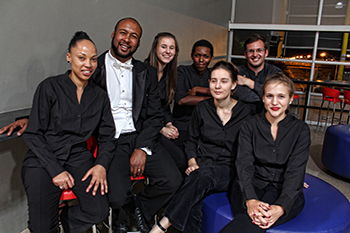Latest News Archive
Please select Category, Year, and then Month to display items
29 August 2024
|
Story Anthony Mthembu
|
Photo Harmse Photography
 Ross van Reenen, CEO of the Toyota Free State Cheetahs.
Ross van Reenen, CEO of the Toyota Free State Cheetahs.
The Business School at the University of the Free State (UFS) recently hosted the CEO of the Toyota Free State Cheetahs, Ross van Reenen, for a guest lecture. Van Reenen presented the guest lecture in the Business School Auditorium on the UFS Bloemfontein Campus on 21 August 2024.
Reflecting on Van Reenen’s address
In a lecture addressed to an auditorium filled with UFS staff and students, Van Reenen’s talk was divided into several sections. Firstly, he spoke about the concept of the ‘black swan’ in reference to the book written by Nassim Nicholas Taleb, titled The Black Swan: The Impact of the Highly Improbable. Referring to Taleb’s book, Van Reenen defined a ‘black swan’ as a rare event that has a severe impact, and the occurrence of which people try to explain. He used some examples to explore this concept as well as its implications, including COVID-19 and its impact on the world, and the tragic death of the people in the Titanic disaster. However, he delved deeper into 9/11 and the extent of its impact, saying that “9/11 was a major wake-up call in the world economy”. Van Reenen highlighted how some companies such as Barclays, for which he previously consulted, had to work to be up and running after the collapse of the Twin Towers in 9/11.
In addition, Van Reenen’s lecture also touched on the importance of the first ninety days of a job after an individual has been employed. “Those first ninety days are crucial, as you have to establish yourself in a company where you are paid less than you are worth,” Van Reenen said. As such, he gave the audience insight into what they could focus on in that time frame. This includes focusing on the small wins, as well as ensuring that you are working at keeping the team together, as the team is an integral part of an organisation.
Van Reenen concluded his address by speaking about his time as the CEO of the Toyota Free State Cheetahs, including some of the decisions he took to ensure the success of the organisation.
OSM Camerata first place winner in international competition
2017-09-08

The OSM Camerata with conductors, Xavier Cloete and
Gerhard de Jager received first place in the
University/Conservatory Orchestra category.
Photo: Supplied
The OSM Camerata received first place in the 2017 Ictus International Music Competition for bands and orchestras. Marius Coetzee from the Odeion School of Music at the University of the Free State said: “The award was announced in time for the celebration of the orchestra’s fifth birthday.”
OSM a catalyst for excellence
The OSMC was strategically founded in 2012 by Coetzee as the OSM’s flagship chamber ensemble, with the main objective of creating a catalyst for excellence.
Over the past five years, the OSMC has premiered 15 new works by South African composers specially commissioned for them. Highlights remain its participation in the 13th International Conservatory Festival in St Petersburg Russia, where the ensemble received a standing ovation during a gala concert in the Glazunov Concert Hall, as well as the world première of the Cello Concerto for an African Cellist by South African composer, Hans Huyssen, with South African cellist, Heleen du Plessis as soloist. The CD was released in 2014 on the New Zealand Classical Music label, Ode Records in Auckland, New Zealand and was one of five CDs nominated for the Listeners' Choice Award New York in March 2014.
Competition draws participation from Washington to Bloemfontein
The inaugural year of this annual competition drew applicants from Washington State in the US all the way to Bloemfontein in the Free State. Video submissions were judged and narrowed down to a final round from which prize winners were selected.
The OSM Camerata with conductors, Xavier Cloete and Gerhard De Jager, received first place in the University/Conservatory Orchestra category.
The competition was founded to highlight the work that music educators, conductors, students, performers and community members make in ensembles at the university, community, youth, high school and middle school levels.
Competition director, Alex Serio says that “many people do not realise the amount of work that it takes to make these ensembles run. What is more is that most of the public does not realise the level of artistic excellence that can be achieved in these ensembles. Ictus International Music Competition was founded to highlight this level